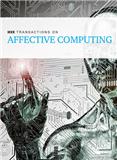
IEEE Transactions on Affective Computing
情感計算匯刊
- 研究方向:工程技術(shù)
- 影響因子:6.288
- 官網(wǎng):https://www.computer.org/web/tac
- 投稿地址:https://www.computer.org/web/tac/author;jsessionid=754ac76dad2796cda19553ce0570
中文簡介
《IEEE情感計算匯刊》是一本跨學科和國際檔案期刊,旨在傳播對系統(tǒng)設(shè)計的研究成果,這些系統(tǒng)能夠識別、解釋和模擬人類情感和相關(guān)的情感現(xiàn)象。該雜志發(fā)表了關(guān)于解釋為什么和如何影響人類與技術(shù)之間的相互作用的原理和理論的原始研究,關(guān)于情感感知和模擬技術(shù)如何能幫助我們理解人類情感過程,以及對仔細設(shè)計、實施和評估系統(tǒng)的研究。考慮影響可用性的因素中的影響。對現(xiàn)有工作的調(diào)查在提出新的歷史觀點和對這一領(lǐng)域的觀點時被考慮出版。該雜志涵蓋但不限于以下主題:感知與分析:從面部和身體姿勢識別情感狀態(tài)的算法和特征情感識別的文本與口語分析情感言語的韻律與音質(zhì)分析聽覺和視覺沖擊波的識別從中樞(如fmri、e e g)和外周(如gsr)生理測量中識別情感狀態(tài)情感狀態(tài)的多模態(tài)識別方法群體情感的認知與心理問題有關(guān)的數(shù)據(jù)收集方法,如情緒誘導和誘發(fā),或技術(shù)方法學,如動作捕捉提供情感語料庫的注釋工具和方法。(網(wǎng)絡(luò))心理學和行為:以便于在計算中使用的方式澄清與“情感計算”相關(guān)的概念(如情感、情緒、個性、態(tài)度)。人類情緒過程的計算模型(例如,考慮情緒影響的決策模型;用戶情緒狀態(tài)的預(yù)測模型)跨文化、群體和跨語言情感表達差異研究對情感計算標準和標記語言的貢獻。行為生成與用戶交互:合成和機器人的視覺、聽覺和文本情感表達的計算模型促進機器實現(xiàn)的各種形式影響的口頭和非口頭表達模型與技術(shù)交互適應(yīng)用戶情感狀態(tài)的方法影響人們情緒狀態(tài)的計算方法定義和評估情感系統(tǒng)可用性的新方法以及影響在可用性中的作用中長期互動中的情緒分析與適應(yīng)方法情感計算的應(yīng)用,包括教育、保健、娛樂、客戶服務(wù)、設(shè)計、車輛操作、社會代理/機器人、情感環(huán)境智能、客戶體驗測量、多媒體檢索、監(jiān)控系統(tǒng)、生物識別、音樂檢索和生成
英文簡介
The IEEE Transactions on Affective Computing is a cross-disciplinary and international archive journal aimed at disseminating results of research on the design of systems that can recognize, interpret, and simulate human emotions and related affective phenomena. The journal publishes original research on the principles and theories explaining why and how affective factors condition interaction between humans and technology, on how affective sensing and simulation techniques can inform our understanding of human affective processes, and on the design, implementation and evaluation of systems that carefully consider affect among the factors that influence their usability. Surveys of existing work are considered for publication when they propose a new viewpoint on the history and the perspective on this domain. The journal covers but is not limited to the following topics::Sensing & analysis: Algorithms and features for the recognition of affective state from face and body gesturesAnalysis of text and spoken language for emotion recognitionAnalysis of prosody and voice quality of affective speechRecognition of auditory and visual affect burstsRecognition of affective state from central (e.g. fMRI, EEG) and peripheral (e.g. GSR) physiological measuresMethods for multi-modal recognition of affective stateRecognition of group emotionMethods of data collection with respect to psychological issues as mood induction and elicitation or technical methodology as motion capturingTools and methods of annotation for provision of emotional corpora. (Cyber) psychology & behavior: Clarification of concepts related to ‘a(chǎn)ffective computing’ (e.g., emotion, mood, personality, attitude) in ways that facilitate their use in computingComputational models of human emotion processes (e.g., decision-making models that account for the influence of emotion; predictive models of user emotional state)Studies on cross-cultural, group and cross-language differences in emotional expressionContributions to standards and markup language for affective computing. Behavior Generation & User Interaction: Computational models of visual, acoustic and textual emotional expression for synthetic and robotic agentsModels of verbal and nonverbal expression of various forms of affect that facilitate machine implementationMethods to adapt interaction with technology to the affective state of usersComputational methods for influencing the emotional state of peopleNew methods for defining and evaluating the usability of affective systems and the role of affect in usabilityMethods of emotional profiling and adaptation in mid- to long-term interactionApplication of affective computing including education, health care, entertainment, customer service, design, vehicle operation, social agents/robotics, affective ambient intelligence, customer experience measurement, multimedia retrieval, surveillance systems, biometrics, music retrieval and generation
近年期刊自引率趨勢圖
JCR分區(qū)
| JCR分區(qū)等級 | JCR所屬學科 | 分區(qū) | 影響因子 |
| Q1 | COMPUTER SCIENCE, CYBERNETICS | Q1 | 13.99 |
| COMPUTER SCIENCE, ARTIFICIAL INTELLIGENCE | Q1 |
近年期刊影響因子趨勢圖
CiteScore數(shù)值
| CiteScore | SJR | SNIP | 學科類別 | 分區(qū) | 排名 | 百分位 |
| 16.30 | 3.266 | 3.768 | 大類:Computer Science 小類:Software | Q1 | 16 / 398 |
96% |
| 大類:Computer Science 小類:Human-Computer Interaction | Q1 | 6 / 128 |
95% |
相關(guān)工程技術(shù)SCI期刊推薦
- SemimonthlyADVANCED MATERIALS
- Journal of Materials Chemistry A
- MonthlyADVANCED FUNCTIONAL MATERIALS
- SemimonthlyAPPLIED CATALYSIS B-ENVIRONMENTAL
- SemimonthlyJOURNAL OF HAZARDOUS MATERIALS
- SemimonthlyJOURNAL OF ALLOYS AND COMPOUNDS
- MonthlyBiotechnology for Biofuels
- Materials Science & Engineering C-Materials for Biological Applications
- MonthlySmall
- MonthlyJOURNAL OF THE ELECTROCHEMICAL SOCIETY
